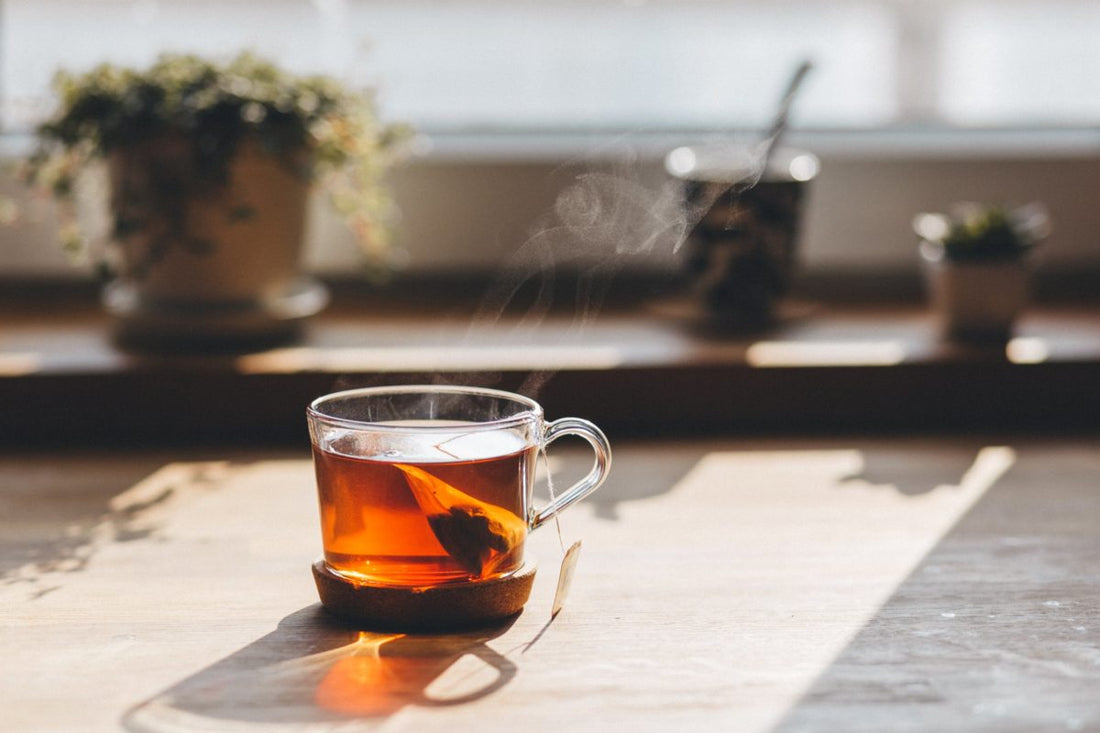Coffee or tea? It’s a debate that’s gone on for thousands of years. Everyone has an opinion, and hardly a day goes by without a new article, video, or scientific study comparing the two.
All you want to know is the answer to a single question: Which beverage is right for your health?
As you’ll see below, the answer isn’t black and white. Choosing the best beverage for you comes down to comparing a host of different factors, then making an informed decision.
Let’s dive in!
Why the Coffee vs. Tea Debate Is Tricky
The coffee versus tea debate has been raging for what feels like forever. They’re some of the most extensively-researched beverages in the world.
The challenge lies in keeping up with the ever-expanding mountain of research, and sifting through it so we can make meaningful comparisons.
We can’t recommend a clear-cut winner simply because there isn’t one. While coffee is superior for some aspects of your health, tea excels in others. You have to weigh the different factors and make your choice accordingly.
Tea (green tea in particular) has had a stellar reputation for decades. It’s featured often on articles discussing “superfoods” and drinks. Nutrition groups have gone back and forth on coffee. But the weight of the recent research shows it can be just as beneficial as tea – sometimes even more so.
Breaking It Down
Ready to figure out whether coffee or tea is right for you?
Let’s go through the different factors to help you make a more informed decision.
Caffeine
Most of us aren’t pounding coffee and teas for their taste alone. We drink them for their energy-boosting effects.
Both tea and coffee are natural sources of caffeine, which has been shown to:
- Boost cognitive function (especially alertness and vigilance)
- Improve your mood
- Increase physical endurance
The difference lies in the dose. While one typical 8-ounce coffee contains between 95 and 165 milligrams of caffeine, an equivalent amount of green tea contains only 25 to 30. Even black tea, a more highly-caffeinated variety, contains only about one quarter the amount as coffee.
Caffeine is a double-edged sword, however. It certainly makes us more alert. But if you drink it too close to your bedtime, it can interfere with sleep.
It takes the body much longer to process caffeine than you might think. One study found that coffee drinkers had a harder time falling asleep than tea drinkers. Even if you don’t feel buzzed, there might be caffeine being processed that makes it hard to sleep.
Effects On Energy
Just because coffee and tea both contain caffeine, their effect on your energy levels is very different.
Teas contain an amino acid called L-theanine, which has been shown to relax the mind without causing drowsiness. So when you take it in combination with the caffeine naturally found in teas, the result is a less dramatic, steadier energy boost.
Drinking tea usually won’t lead to a dramatic increase in energy like you’d experience after drinking coffee. But it also minimizes that anxious, jittery feeling you might feel after that second or third espresso.
With coffee, the combination of higher caffeine content, and lack of L-theanine results in a much more dramatic energy spike. It’s probably the best choice for an overnight drive, for instance. Whereas tea might be better suited for a quiet study session.
There isn’t a clear winner here. It just depends on what the situation calls for. Some people like to have a cup of coffee or two in the morning to help them wake up, then switch to less-caffeinated teas as the day passes.
Taste
Although this isn’t directly related to health, we can’t overlook the importance of taste.
Coffee is grown all over the world, but the vast majority of it is aromatic and bitter. It’s also more acidic than tea. That and the higher caffeine content makes it a potential problem for people experiencing chronic indigestion, heartburn, or acid reflux symptoms.
Teas come in a huge variety of flavors as well. But they tend to be much milder than coffee overall. More people can probably stomach drinking unsweetened tea than black coffee.
The best taste for you comes down to personal preference. The key? Be careful about adding sugars and other sweeteners. If you can’t handle the taste without loading it with sugar, the consequences – weight gain, type 2 diabetes, and metabolic syndrome, just to name a few – could outweigh the health benefits.
Finally, if you absolutely can’t stand coffee or tea, there’s no reason to force yourself to drink it. You can maintain a healthy lifestyle with diet, sleep, and exercise just fine.

Assessing the Health Benefits
More research is emerging all the time linking both coffee and tea with numerous health benefits. As you’ll see just below, these benefits include the physical and mental.
Here’s a quick rundown of some of coffee’s most important health benefits:
- A rich source of nutrients – Coffee is more than just muddy water! Just one cup contains 11% of the recommended daily amount (RDA) of vitamin B2, 6% of the RDA of vitamin B5, and 3% of the RDA of potassium and manganese. If you drink several cups a day, that really adds up.
- Helps burn fat – Because it contains caffeine, coffee is one of the only natural sources that helps burn fat. It can boost the metabolism between three and 11%. One study noted an increase in fat burning for both lean and obese people.
- Antioxidant effects – Coffee contains tons of antioxidants, including polyphenols and hydrocinnamic acids. These antioxidants protect us against damage from free radicals. This is huge because free radicals are responsible for premature aging and can increase the risk of diseases from type 2 diabetes and heart disease.
- Boosts your mood – A Harvard School of Public Health study found that women who drank four or more cups of coffee were 20% less likely to be depressed than those who didn’t. Another study followed over 85,000 women for 10 years and noted a connection between coffee consumption and reduced suicide risk.
- May protect against neurodegenerative diseases – Coffee can help keep the brain humming along smoothly into old age. Multiple studies have linked coffee consumption with a decreased risk of neurological diseases like Alzheimer’s, Parkinson’s, and even dementia.
Now let’s explore some of tea’s health benefits:
- Antioxidant effects – Tea is packed with compounds like catechins and epigallocatechin gallate (EGCG) that create a powerful antioxidant effect. Green tea has the highest concentration of antioxidants because it’s the least processed. Herbal teas, however, don’t have the same antioxidant effects because they’re actually made from other plants.
- Boosts insulin sensitivity – The polyphenols (another type of antioxidant) in tea help your body regulate blood sugar. This increased insulin sensitivity explains why long-term tea consumption has been linked to improvements among people treating obesity, type 2 diabetes, and metabolic syndrome.
- Aids weight loss – Tea’s combination of caffeine and other bioactive compounds (like catechins and EGCG) can make it an effective tool if you’re trying to lose weight. One study found that green tea extract increased the metabolic rate of healthy men by 4% over a 24-hour period. A study published in the International Journal of Obesity noted a positive effect on weight loss and weight maintenance.
- Improves heart health – Tea’s potent antioxidant effect can lead to a healthier heart. Harvard Medical School noted a study of over 40,000 Japanese adults that found those who drank more than five cups of green tea daily had a 26% lower risk of dying from a heart attack or stroke than those who drank less than one cup daily. Another meta-analysis of 14 trials found green tea significantly lowered LDL cholesterol and triglycerides.
- May protect against neurodegenerative diseases – Like coffee, tea may help promote healthy brain aging and stave off cognitive diseases. We need more human studies to be sure. But results on animals and in test tubes have linked catechins with decreased risk of Alzheimer’s and Parkinson’s disease.
Both lists are quite impressive, but make it impossible to decide which set of benefits is more important! For that reason, you can’t go wrong if you choose coffee, tea, or both.

Coffee vs. Tea Is Your Call
The coffee versus tea controversy is simply too close to call.
It’s ultimately a personal decision. Either beverage can play a part in a healthy lifestyle. Maybe you’ll skip them altogether. Or drink both!
Beyond the health benefits, we have to stay mindful of whether we enjoy the taste and how it affects our energy levels. Some of us love that quick spike in the morning after our coffee while others prefer the more subtle, steady energy supply of tea.
We have to strike a balance between powering through the workday and getting enough rest. If you struggle to get to sleep, think about cutting off your caffeine intake earlier or switching to tea, which is less caffeinated, in the afternoons.
Too much added cream and sugar can create worse problems than the caffeine itself. So if you can’t stomach the taste of your coffee without tons of sweeteners, it might be time to cut back or switch to tea (or vice versa). Enjoy your beverages unsweetened if you can. You could always use a splash of camel milk, almond milk, or another dairy-free alternative.
Finally, if you feel absolutely miserable without your coffee or tea, that’s a good sign it’s time to cut back. Caffeine tolerance exists on a spectrum. You might be very sensitive, or dealing with a bout of adrenal fatigue that needs to be sorted out with fundamental diet and lifestyle changes – instead of a quick caffeine boost.
Rising Above the Debate
The coffee versus tea debate doesn’t show any signs of slowing down. That’s okay. You don’t have to get pulled into it anymore.
You can drink one, the other, or even both. As long as you keep in mind the health factors above, you’ll have the knowledge you need to make the best decisions possible.
Do you prefer coffee or tea? Have you ever switched from one to the other? Did you notice any changes? Leave a comment below and let us know!

 Log in
Log in
